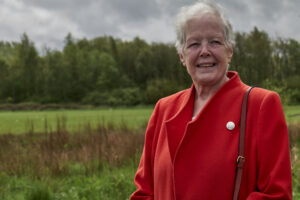Alice

Alice lived alone in a small flat in the south of England, with help from nearby family and visits from a worker from a homecare agency. One night she fell from her bed and admitted to hospital for observation.
When it was time for Alice to leave the hospital, social services decided she should be transferred to a residential home of their choice. They called it a ‘care home’ which was such a negative and stigmatising term. There was no consultation with us as a family.
The people who lived in the home needed a lot more help than Alice, spending much of their time in bed. So, Alice had little company during the day. She also had to share her bedroom with another resident, a person she did not know and had not chosen. The food was indifferent.
Alice was unhappy.
As a family we decided there must be a better place for Alice and we set about finding one.
We managed to fine a large-ish home on 3 floors and with substantial grounds. People from the company who ran it made a lot of the standard of care they offered and how well they looked after residents. Alice moved in and she and we felt positive for a better future.
Soon we realised that promises had been false. Alice and other residents did not go out in the minibus as promised. She could not go out into the garden as all the doors were locked to stop people with dementia getting out. She was offered no choice of meals or times. Most of the other residents were not able to socialise with Alice and she felt very alone.
All residents, including Alice were sent to their bedrooms early in the evening the support at night was poor. People who lived in the home had access to a call bell which they would use to summon staff. It was common for these bells to ring and ring, going unanswered for some time. On one occasion when we visited the local Care Quality Commission inspector was present. We raised our concerns which were dismissed with indifference. She made it apparent that she and the owner knew each other well.
Alice was unhappy.
We live in the north of England and decided to help Alice relocate to live nearer to us. We thought we could find somewhere much better, spend time with her socially and help her get the kind of life she deserved. We found a local residential home that looked lovely. As with the previous place promises were made; that Alice would have trips out, go out to local shops and coffee bars and have help to go to Church on a Sunday. None of these ever happened. Alice was promised a choice of meals, which were never available. She wasn’t even allowed to make toast if it wasn’t at mealtimes. We were told that no one was trained to be able to use a toaster!
Alice was unhappy
So we set about once again to find somewhere near to family down south. This time we found a smaller home with more thoughtful staff. It was probably the best of the lot, but we still heard promises that were never kept and she continued to find herself isolated. Thankfully despite the negatives she was much more settled.
Reflecting on care that doesn’t care
So, there we have it. As we, as a family, reflect on our view of the care system we reflect on homes, large and small, north and south that promise the earth and deliver very little.
Homes that don’t seem to understand that people need friends, time out doing things they enjoy and usually do not want to be in bed by mid evening. That don’t seem to understand the importance of control and choice and that most people know what they would like to eat.
A soul and self-destroying routine based on the needs of the group and the institution rather than on people like Alice. Too often we saw Alice and other residents woken and dressed in ill fitting, sometimes other people’s, clothes. Clothes badly cared for and laundry misplaced. Breakfast, then people moved to a central area, the television switched on no matter the programme. Alice and others left in their respective chairs until someone came around with tea or coffee, calling everyone “love. Alice left to her own devices until lunch. The same repeated in the afternoon, then evening meal, back into a chair before whisking off to bed. Understaffed with many workers whose accents are difficult for people to understand.
No time for conversation and/or no one to converse with. No availability of books or magazines, no daily papers for the up-to-date news. Nothing to challenge or stimulate. The same old food. No checks on hearing aids or glasses. Repeat day in day out with little or no change.
As a family we cannot imagine what it must feel like to be punted into one of these places where suddenly you have your independence removed and you are bundled together with complete strangers.
What needs to be different?
Reflecting on Alice’s experiences and ours as a family we believe strongly that the current approach to quality and standards within residential care homes are not working. Different standards are needed, and those standards need to be enforced.
Promises made in advance should be kept. There should be recourse to the regulator or an ombudsman if they are not kept. Promising and not delivering would not be allowed in any other sector or for any other paying customer. Why is it allowed, or even ingrained, within the care home sector?
Every home should have sufficient staff to enable them to spend time talking to people; pulling up a chair and spending time not merely passing comments as they go about the working day. There should be proper menus for all meals and availability of snacks during the day. For those that want to there should be trips out with staff support at least once a week. The theatre or cinema would be good. Treating everyone the same or as a group should be banned. We are all individuals, with different life histories, interests and skills. In our opinion, and on behalf of Alice, we want to say that care and support that can’t see and support the individual is not care at all!

